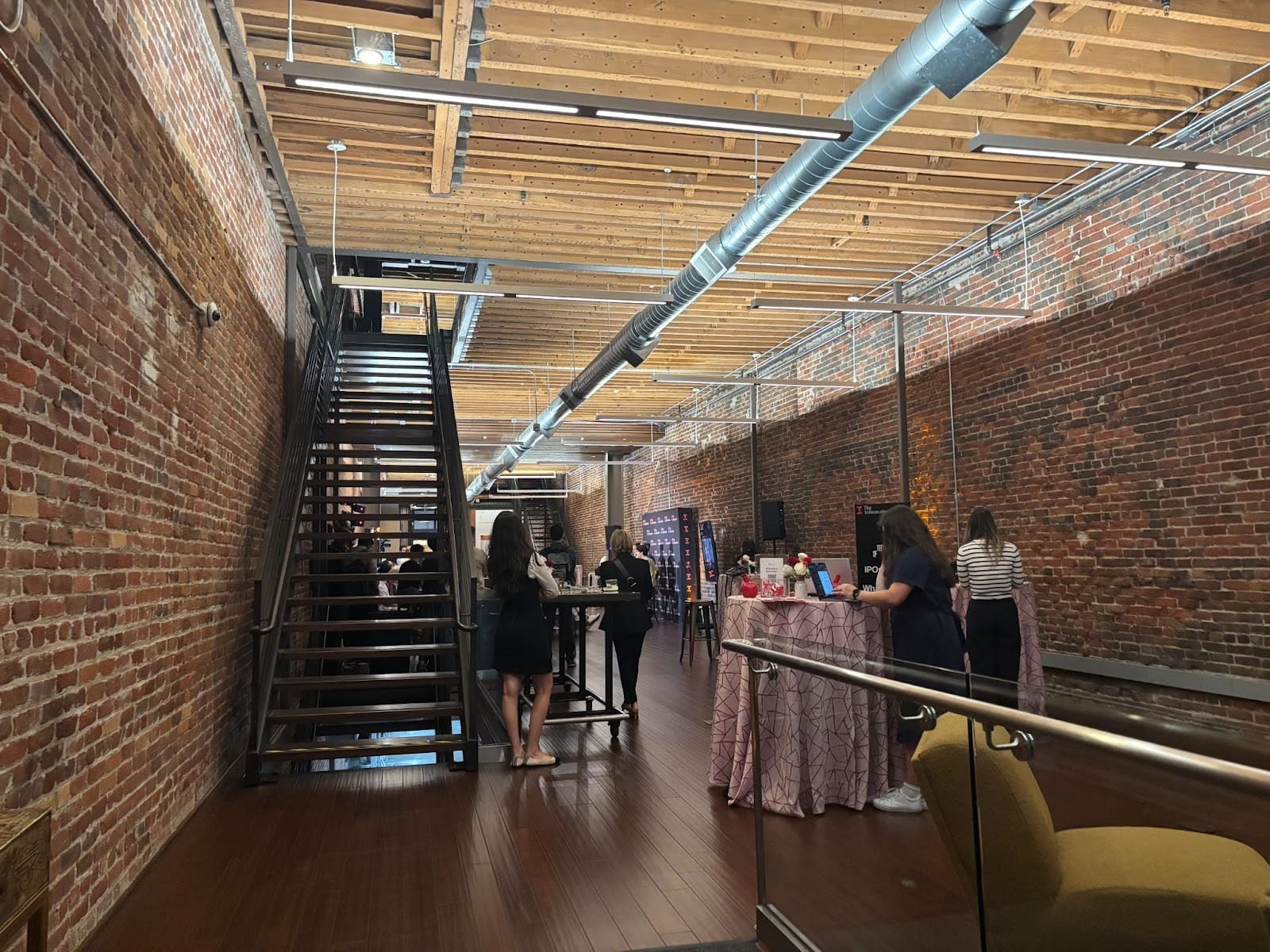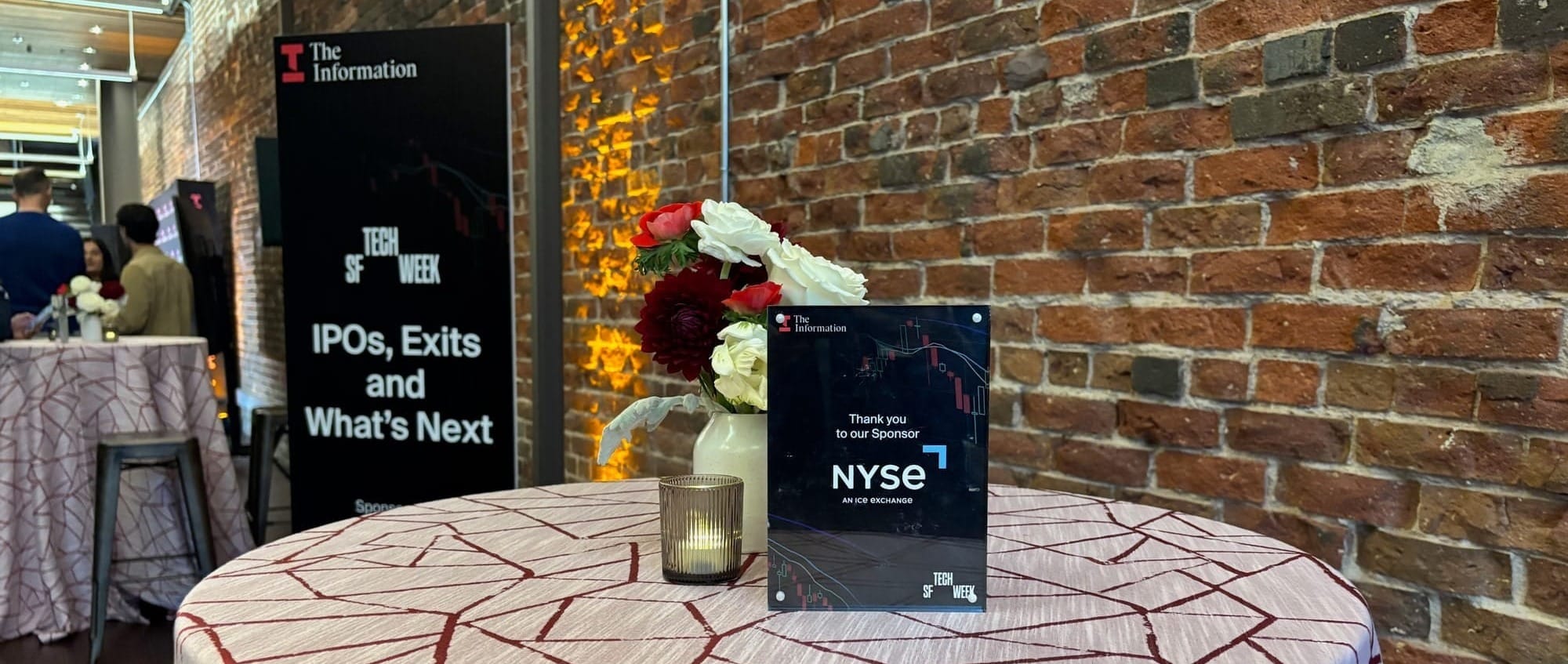The founder of Tech Week is a woman named Katia Ameri, also a partner at a16z. I first learned about her, and Tech Week, because I have been cultivating a minor obsession with a16z’s efforts towards building out an internal media company, which has involved clicking around a lot on X and at one point ending up on Ameri’s profile. The firm has long compared itself with the Hollywood agency CAA, and this summer they’ve been hiring podcasters, Substackers, and a former Gravel teen. Tech is chomping at the bit to tell stories about itself now that it’s easy to ignore legacy media, largely because tech decided to kill it. Tech Week appeared to be a totally separate operation, but it seemed to me to share a bit of that new media DNA, and thus my week of vibe reporting was born.
By Thursday, though, I had grown very weary of the AI boom of it all. I had initially RSVP’d to an AI startup pitch event, but I’m sure it would have been the same talking points, hyperbole, and, well, vibe, of everything else I’ve attended. I needed something different. All week I had been navigating the event listings myself, but for my final Tech Week experience, I thought I’d let Katia call the shots. She had been tweeting out (posting on X?) a list of featured events every day, so, on Thursday morning, I visited her profile and made my selection. One event stuck out, because it included words I recognized: “IPOs, Exits, and What’s Next: The Information & NYSE.”
The fact that The Information is behind a paywall, coupled with my lack of, as one says, “business need” to read it, has meant I’ve known about the site for a long time but never developed a sense of its reporting and identity. All I’ve known is that it’s a heavy hitter and very much for the tech industry. But in a week of mostly not-of-my-world references, I clung to one I knew: media company.
The event took place at The Howard in SoMa. The walk from the Montgomery BART station at 5:30 PM was bustling, and it has been an unexpected outcome of my nightly forays to the West Bay that I feel dropped into the actual rhythms of the city, rather than (as normal) just being a stressed or curious visitor. For better or worse (mostly for worse), spending ninety minutes in a room full of people discussing their work and the financial market for billion-dollar companies increased the dropped-in feeling tenfold. A new embodied groove of San Francisco cracked itself open for me: the capitalist one, the one that flits from fancy building to fancy building, sees possible exchange in every ecounter, and is on calls all the time.
When I got to The Howard, a very polished woman allowed me to register on the spot. I took a nametag, grabbed a passed appetizer, and surveyed the crowd. I was feeling confident. I wasn’t going to let another event pass me by without getting some conversations in, so I adopted a “professional white woman” posture and told people the truth: I was there as an outsider who is interested in learning more about the tech world. (My girlfriend thinks everyone probably assumed I was there looking for a job.)
I spoke with a founder from South Korea who was there to learn what getting a company ready for an IPO entails, who had a product that would allow people to submit writing that the company would then print onto paper and mail to grandparents. Then I chatted with the head of comms for a biotech company who had driven up from Los Altos that night. And then two young women from a16z came over to our table, not in a representative capacity, but because they actually wanted to be at the event. The conversation was light, just networking small talk; I was wondering to myself if any of these people voted for Trump. Every man was in professional clothing except for one: an older guy wearing a trucker hat, a tie-dye “Space Aliens Grill & Bar” t-shirt, and overalls. I figured he was very, very rich.
Katie Roof, a deputy bureau chief at The Information, led the panel. I had never heard of her before, but as soon as she opened her mouth (“IPOs, so they’re back,” she said), it was clear that this was her element. Her panelists were a New York Stock Exchange executive, the CFO of Carta, and the CBO of Brex, and it took almost no time for everyone on the panel to drop in and engage with the content.
Despite my deep ideological disdain for everything the individuals on the panel represented, for the first time all week, I respected them. The conversation was, and I mean this honestly, fascinating. It reminded me of a tweet I once saw describing business journalism as a freer arena for reporting than another subject, because the whole enterprise relies on saying the quiet part out loud. “The investor market only cares if your start-up ends in .ai but the public market just cares about profitability and growth,” for example, is a thing that was said, and “CloudWeave’s data centers are actually a real estate play, not an AI play.” Then there’s the whole, you know, “this feels like the dot-com bubble or the 2008 bubble” admission, spoken as if those bubbles had no material effect on people’s lives. I learned that a unicorn that has fallen precipitously in value is called a “unicorpse.” And really, I spent most of the panel actually learning. A couple times I detached enough to notice things like how the NYSE and Carta execs sometimes took on a posture of wizened dads to keep the rogue, young CBO in check with his hotter takes on market trends. Or the way Katie Roof’s slightly flirtatious and negging moderating style may be the outcome of years as a woman breaking countless stories in a male-dominated field.
But mostly, I started fantasizing about how much more powerful I would feel if I actually knew what was going on in the world of these capitalists. That I wouldn’t just feel angry and powerless all the time, unsatisfied and uninspired by most of the ways of doing politics that I could most easily tap into, stuck feeling some sense that they weren’t adequately identifying and targeting the enemy. I started fantasizing that, if I developed an intimate understanding of markets and the securities they trade, I would remain pure of heart and purpose, that I would resist the religiosity of “number go up,” and I would emerge a more effective and useful participant in politics.
But maybe that fantasy is symptomatic of the religion itself. Maybe all I would get is a psychological bandaid, giving me the illusion of control in a city and region where markets have dominated since their colonial inception, and where we live within the sharp edges and abstract domination of their wake. I left the event and walked right back into the bustle, SFMOMA glinting high above me, my brain buzzing with the high of learning something new. It felt like I could tap into a collective feeling of being on the streets of downtown San Francisco, something I’ve been chasing since I moved here. I met up with my girlfriend to head to North Beach for dinner and she told me I should start reading Matt Levine. I said I gave that a shot once before, but I found it mind-numbingly boring.—Annie Lloyd

